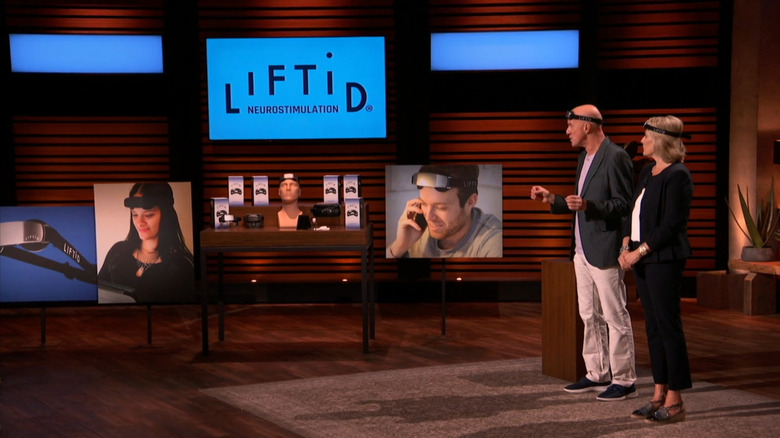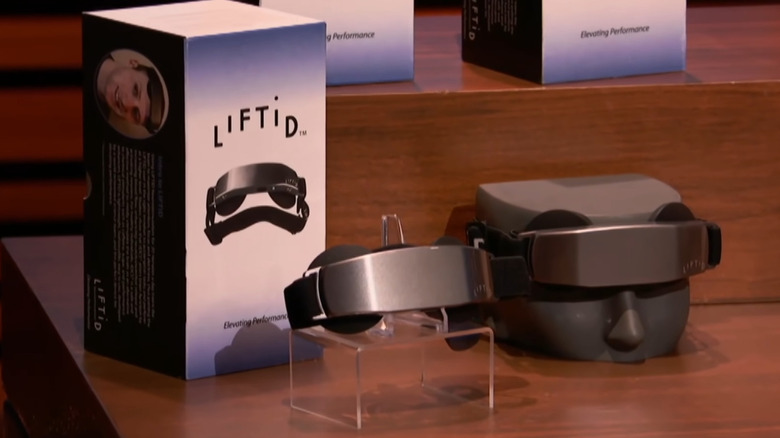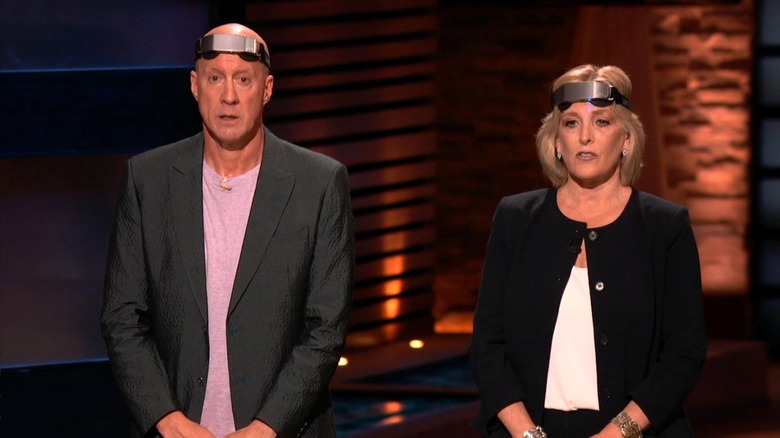Whatever Happened To LIFTiD After Shark Tank?
We may receive a commission on purchases made from links.
Before leaving a ... unique ... impression on "Shark Tank," Ken and Allyson Davidov saw LIFTiD as a vision of the future. LIFTiD acts as an alternative to supplements such as coffee and energy drinks, increasing cognitive speed using what is known as transcranial direct current stimulation (tDCS), a method supported by thousands of published studies. When you wear the LIFTiD across your forehead like a headband, tDCS activates your brain's frontal lobe using two electrodes attached to the device. Using LIFTiD for 20 minutes a day while performing a task is said to help sharpen focus and memory.
Ken developed the idea with New York-based neurosurgeon Dr. Theodore H. Schwartz and launched it in 2016, distributed by the neuromodulation device company Caputron. The team saw the technology as having rich potential for such users as students, professionals, gamers, athletes, and more. Ken has worked for companies such as Hasbro in sales, as he shared on "Shark Tank," while his wife, Allyson, is a realtor with extensive experience in marketing.
It was going to take a lot for the pair to win over the sharks. Technology with bold claims can be a point of contention for wealthy investors, and LIFTiD certainly fit this category. But the tank can be a place full of surprises, so was LIFTiD able to break the mold?
What happened to LIFTiD on Shark Tank?
Ken and Allyson Davidov appeared on Season 12 of "Shark Tank" looking for a $200,000 investment for 10% of LIFTiD. The sharks' faces were frozen with the expressions one would expect upon learning of such a concept, but they heard out the spirited couple nonetheless.
The investors tried out the device and were taken aback by how it felt, with some claiming it felt like being shocked. Allyson stated that using it while performing an activity was the best scenario while Ken assured the safety of LIFTiD due to the thousands of studies done on tDCS. But as he explained how the product activates neurons, Mark Cuban pulled out a booklet provided in the LIFTiD sample and began reading the warnings out loud, which stated that the device holds no medical benefit. The Davidovs said that the item's main purpose was for memory and cognitive sharpening, but Cuban didn't see the point if it wasn't truly assisting anyone. Ken barely let Kevin O'Leary get a word in regarding sales as he went on about his professional experience. Since the previous October, the company had made $126,000 in sales.
In the end, no shark took the bait. They each went out, not connecting with the business or feeling safe about selling such a product. Robert Herjavec found their presentation especially abysmal given how much Ken spoke over the investors. The always opinionated O'Leary even went as far as commenting, "I believe you're a great sales guy ... but you are now in the lexicon of the craziest pitches ever on 'Shark Tank.'"
LIFTiD after Shark Tank
Not getting a deal on "Shark Tank" is tough enough, but being deemed one of the show's most absurd presentations is no small feat, given competition such as Squirrel Boss, which the judges called sadistic, and the Ionic Ear, which Barbara Corcoran said was the worst pitch she'd ever heard.
Thankfully, the LIFTiD team came out more grateful than hateful in the end. In a PR statement, Ken Davidov said, "'Shark Tank' was an amazing experience. While we may not have gotten any bites from the sharks, we can't express how thankful we are to have had the opportunity to bring LIFTiD and tDCS to the masses on a national stage. I hope we can share this technology with as many people as possible — particularly in times like these, when concentration and productivity can be difficult while confined to working or learning from home."
While LIFTiD may not have fared the best while in the tank, the off-kilter concept intrigued many others. Following the airing of LIFTiD's "Shark Tank" segment on November 13, 2020, the company saw a notable increase in online traffic so intense that the team opened up an additional storefront on Amazon to accommodate the surge.
Is LIFTiD still in business?
Previously, you could purchase LIFTiD on Caputron, Amazon, and the LIFTid website. However, as of November 2024, all these places list the item as unavailable. If you're wondering why, the LIFTiD site says the device is out of stock because they're "doing a full redesign and repackaging for this popular tDCS headset. We are not sure of the next in stock date."
We're not exactly sure what that means for LIFTiD's future. Do they really have a new take on their electric device, or is the company struggling? Either way, the reception of the device has been mixed. While LIFTiD sports a decent rating on Caputron from a small pool of users, its Amazon score, which comes from more customers, is less impressive. Most seem to generally like and recommend the product, but issues regarding its battery life have come up, as well as some who generally didn't see any noticeable difference in performance.
And of course, with such new technology, many are likely to have the same baffled reaction to LIFTiD as the sharks did. The company has made efforts to ease these anxieties, however, through a page on its website answering questions and concerns regarding the technology and tDCS. The page includes several videos featuring neurosurgeon Dr. Theodore H. Schwartz that dive into the effects of tDCS on the brain, along with a list of references. Here's hoping the new version of LIFTiD will hit the market soon, providing assistance and shocks for everyone.
What's next for Ken Davidov?
Ken Davidov may have put his heart and soul into LIFTiD, but it's far from the only idea he has in store. Along with being the creator of LIFTiD and the founder and a partner of the company that owns it, RPW Technology, Davidov also lists himself as a founder and partner of technology brands Global Ionics and Taste Boosters, the latter of which creates organic flavor enhancers.
Davidov described how he views his ambitious endeavors in an interview with Medium, saying, "I have been working on technologies that combine the human body, battery power and a mild electric current to introduce new products that can provide an incredible wellness benefit. All of our products are not only available to consumers but are disruptors in that they all incorporate our groundbreaking technologies."
In the interview, he talked about some of his other innovations. One of these is the HyGenius toothbrush, which utilizes ionic technology to provide a healthier clean. The other is the SpoonTEK, a commercial utensil that is said to enhance taste and flavor. Davidov sees great potential for the latter creation, telling Medium, "By exciting the taste buds, we are hopeful that the health community may be able to use this technology for those who may have lost their sense of taste from an illness, medications, or aging. That will surely shake things up!"
The idea of combining natural human senses and new technology will take some time to become commonplace, but that doesn't seem to be a concern for the optimistic Davidov.
"Shark Tank" is available for purchase on Prime Video.




